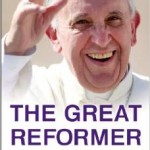Yes, we’ve been joking for some time about how Pope Francis and I appear to be in some kind of mind-meld on the subject of idols — he talks about them almost every single week, and brought them up in his encyclical, Lumen Fidei*. In today’s homily, Pope Francis really hit hard on the theme:
Once again, the liturgy of the Mass elicits from Pope Francis a reflection on the traps that punctuate the life of faith: To become an apostle of one’s own ideas, or a devotee of one’s own well-being, rather than that of God . . .
“…we all have need to worship – because we have the imprint of God within us – when we do not worship God, we worship creatures. And this is the passage from faith to idolatry. These people, idolaters, have no excuse: because having known God, they have neither glorified nor worshipped Him as God. And what is the way of idolatry? [Saint Paul] says clearly: ‘they became vain in their reasoning, and their senseless minds were darkened.’ The selfishness of their own thoughts, the omnipotent thought, that which I think is true: I think the truth, I make the truth with my thought.”
And here, Pope Francis immediately responds to the objection that this problem doesn’t arise, because no one goes around worshipping statues. It’s not so, the Pope replied: idolatry has found new forms and fashions:
They’ve become foolish and exchange the glory of the incorruptible God with an image: myself, my ideas, my comforts . . . It’s not only something historic – even today, along the way there are idols . . . We all have within ourselves some hidden idol. We can ask ourselves, in the sight of God: what is my hidden idol? What takes the place of God?”
I love that His Holiness is getting to the crux of the matter — that, as Gregory of Nyssa said, “ideas lead to idols.” In chapter two of Strange Gods, I write:
The true roots of sin, the roots that grow into actions like murder, are seeded within the mind, which is where idolatry always begins.
No idol is constructed in the act of murder. Rather, the murder is, at its end, an offering to an idol. The real idol is the enlarged anger within us, and it forms through our willingness to sustain an idea about our righteousness and, therefore, an idea about ourselves. We cling to resentment or feed jealousy until it grows into something we burnish daily with our justifications. We get it to glitter in our minds like something alive, like a genuine force outside of ourselves. . .The great evil of murder, then, is the fruit of the idolatry that is first an idea, and the idea is almost always about the self.
Part of the reason the “Abortion is Murder” signs are unpersuasive is because they are overused and no longer “news” to anyone, and it invites no further thought. Perhaps those signs should be replaced with ones that read “Abortion is the Fruit of our Idolatries”. It’s accurate and it invites wondering. As Gregory of Nyssa also said: “only wonder leads to knowing.”
But I digress. What do I mean in the header, about a “meme on the rise”?
 The other day I received an email from a gentleman named Peter (Peter T, not Peter CCLXVI – as if!), who shared this section of Lumen Fidei, and then his thoughts:
The other day I received an email from a gentleman named Peter (Peter T, not Peter CCLXVI – as if!), who shared this section of Lumen Fidei, and then his thoughts:
Once man has lost the fundamental orientation which unifies his existence, he breaks down into a multiplicity of desires; in refusing to await the time of promise, his life’s story disintegrates into a myriad of unconnected instants. Idolatry, then, is always polytheism, an aimless passing from one lord to another. Idolatry does not offer a journey but rather a plethora of paths leading nowhere and forming a vast labyrinth.”
Reading those words I also thought: ‘Hmm…there’s a Meme on the rise here. First the Anchoress writes a book about worshipping self-created idols, and now the Pope has stuck his oar in the water on that same subject. Maybe I need to add these books to my reading list.’ So I logged on to Amazon, ordered your book and pre-ordered the English translation of The Light of Faith which, at that time, had not yet been released.
All emphasis mine. As much as I’ve been joking about mind-melds, it does leave me abashed to think of someone buying Strange Gods along with His Holiness’ encyclical, but I have to admit that Peter’s notion of “a meme on the rise” is a thought I have entertained myself. It’s just too weird that I was delayed almost six months in publishing the book due to writer’s block, which I never get. Too weird that Strange Gods ended up being published right around the time we were given a pope who talks about idolatry and urges us, daily, to look away from ourselves and toward God, toward Christ.
And he always speaks it with such urgency.
It feels, as I’ve said elsewhere, as though we are being made fit for something, as though the Holy Spirit wants to get out of our own heads, help us to turn away from the ipads and iphones that keep us so engrossed and distracted that — astoundingly — we don’t even notice men with guns until they fire.
That sort of self-absorption is going to leave us most unprepared when we find ourselves out of options and with no where to turn, except toward heaven. Perhaps all of this talk of idols and idolatry is the Holy Spirit earnestly trying to wake us up from a selfish slumber, so that we may right our orientation — identify what have become our false, strange gods and clear them from our path — so that when we realize our need to “run the way of thy commandments” we will be unencumbered, with nothing to slow us down, or trip us up.
*If you haven’t seen it, Pat Gohn has been running an excellent multi-parter that looks at Lumen Fidei section by section, and helps to flesh out how we can apply it to our lives. See Part I here , and Part II here. Part Three will be up this Friday!
UPDATE:
Mark Shea is also pondering idolatry today:
. . .the makers of idols typically imagine God is going manifest himself in something big, splashy and cinematic, when the vast majority of times he’s feeding the hungry, giving drink to the thirsty, clothing the naked and visiting the sick. If you’re looking for him don’t look for him in the fire, earthquake, or storm. Listen for the still, small voice.












